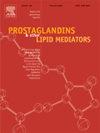Role of lysophosphatidic acid in the regulation of immune cells and hematological malignancies
IF 2.5
3区 生物学
Q3 BIOCHEMISTRY & MOLECULAR BIOLOGY
Prostaglandins & other lipid mediators
Pub Date : 2025-09-01
DOI:10.1016/j.prostaglandins.2025.107028
引用次数: 0
Abstract
Lysophosphatidic acid (LPA), a small bioactive glycerophospholipid, has been reported to play an indispensable role in the regulation of a wide range of cellular processes, including cell proliferation, morphology, differentiation, invasion, migration, and apoptosis. Besides, it has a diverse role in the development, differentiation, migration, and trafficking of immune cells. The role of LPA in the functioning of immune cells, such as macrophages, natural killer cells, T cells, and B cells has been poorly understood and is still a major thrust area for immunological research. Further, accumulating experimental evidence indicates the pro-tumoral action of LPA in various cancers, including hematological malignancies. Hematological malignancies or blood cancers are a group of neoplastic conditions derived from the cells of hematopoietic tissues. LPA is reported to promote the development and progression of cancers of hematological origin through altering apoptosis, invasion and migration, metabolism, and anti-tumor immune response. But still, the mechanistic pathways by which LPA supports the development and progression of hematological malignancies are not well explored. The present review aims to provide an elaborate survey on the role of LPA in the functioning of immune cells and its implication in hematological malignancies.
溶血磷脂酸在免疫细胞和血液恶性肿瘤调节中的作用
溶血磷脂酸(LPA)是一种小的生物活性甘油磷脂,在细胞增殖、形态、分化、侵袭、迁移和凋亡等一系列细胞过程的调控中发挥着不可或缺的作用。此外,它在免疫细胞的发育、分化、迁移和运输中具有多种作用。LPA在免疫细胞(如巨噬细胞、自然杀伤细胞、T细胞和B细胞)功能中的作用一直知之甚少,仍然是免疫学研究的主要领域。此外,越来越多的实验证据表明LPA在包括血液系统恶性肿瘤在内的各种癌症中具有促肿瘤作用。血液恶性肿瘤或血癌是一组源于造血组织细胞的肿瘤状况。据报道,LPA通过改变细胞凋亡、侵袭和迁移、代谢和抗肿瘤免疫反应,促进血液学来源的癌症的发生和进展。但是,LPA支持血液恶性肿瘤发生和发展的机制途径尚未得到很好的探索。本文就LPA在免疫细胞功能中的作用及其在血液系统恶性肿瘤中的意义作一综述。
本文章由计算机程序翻译,如有差异,请以英文原文为准。
求助全文
约1分钟内获得全文
求助全文
来源期刊

Prostaglandins & other lipid mediators
生物-生化与分子生物学
CiteScore
5.80
自引率
3.40%
发文量
49
审稿时长
2 months
期刊介绍:
Prostaglandins & Other Lipid Mediators is the original and foremost journal dealing with prostaglandins and related lipid mediator substances. It includes basic and clinical studies related to the pharmacology, physiology, pathology and biochemistry of lipid mediators.
Prostaglandins & Other Lipid Mediators invites reports of original research, mini-reviews, reviews, and methods articles in the basic and clinical aspects of all areas of lipid mediator research: cell biology, developmental biology, genetics, molecular biology, chemistry, biochemistry, physiology, pharmacology, endocrinology, biology, the medical sciences, and epidemiology.
Prostaglandins & Other Lipid Mediators also accepts proposals for special issue topics. The Editors will make every effort to advise authors of the decision on the submitted manuscript within 3-4 weeks of receipt.
 求助内容:
求助内容: 应助结果提醒方式:
应助结果提醒方式:


